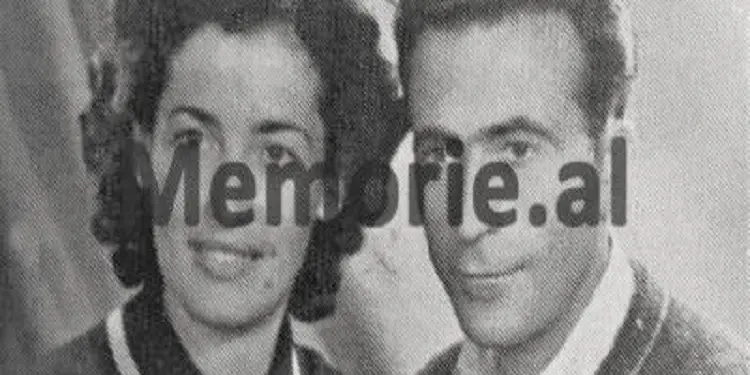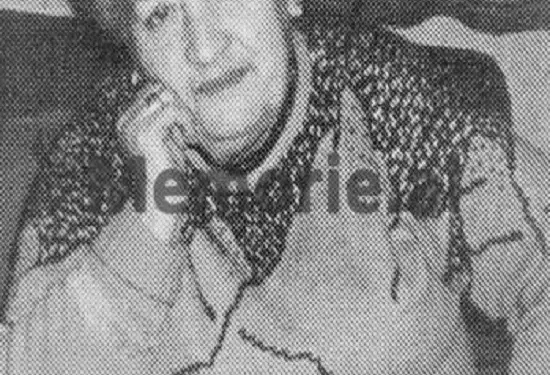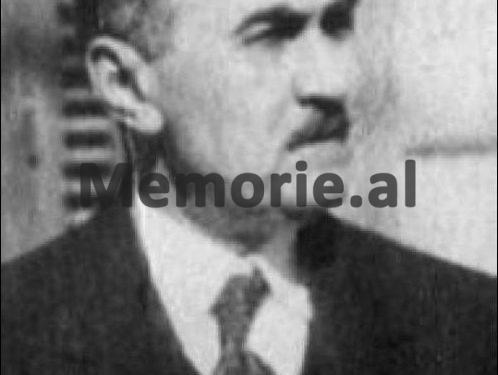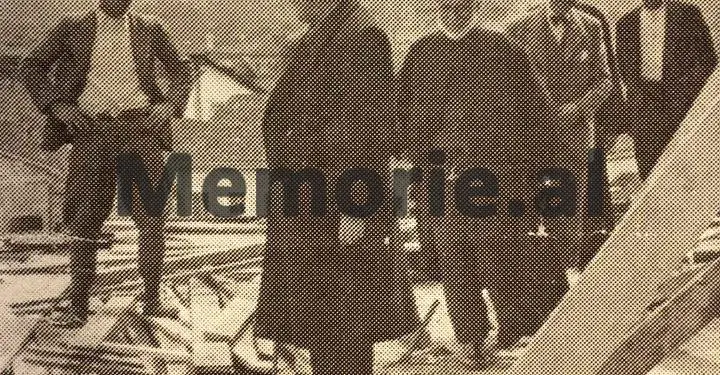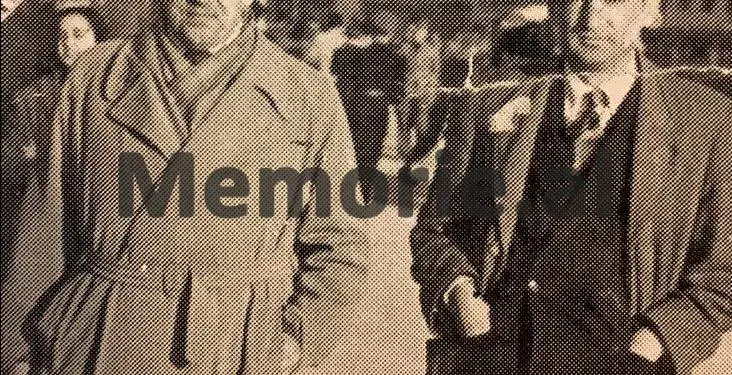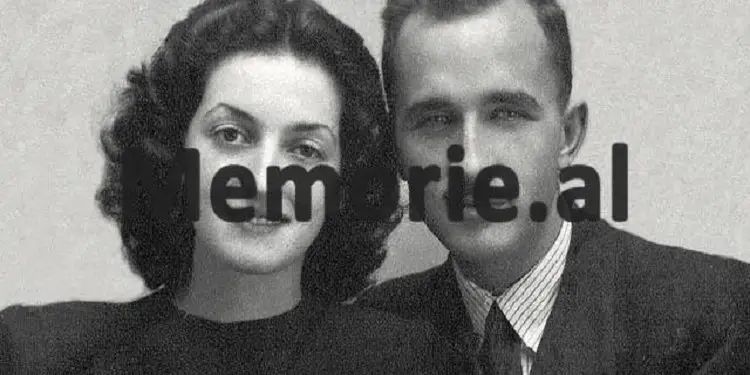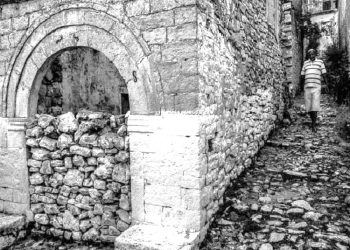Dashnor Kaloçi
Memorie.al publishes the unknown and painful story of Mit’hat Qela, originally from Kavaja, who after growing up in the Vorfnore Shelter in Tirana, graduated with honors from the classical gymnasium of Shkodra in the dormitory “Our Mountains” and won a scholarship. state by the government of that time, to pursue higher studies at the University of Pisa in Italy, which he discontinued after a year and went on to pursue them in Vienna, attending the Polytechnic Faculty, in the branch of Hydrotechnics. The termination of his studies in 1947 and his return to Albania, where after working for some time as chief planner in one of the enterprises of the city of Durrës where his family was located at the time, he was fired after marrying the daughter of the former Zog’s minister, Javer bey Hurshiti, who was shot in the Special Court in March 1945, refused to part with her, even after much pressure was put on him. The testimony of his wife, about Mit’hat Qela, who was brought before the Military Court in Tirana, accusing him of calling Stalin: ‘The greatest dictator that humanity has ever seen’ and he refused to deny what he had said, from where he would be released from the courtroom, sentenced to 10 years in political prison, which he suffered from the Maliqi swamp, and in all other camps that had been opened at that time in Albania and after his release from prison worked as a painter in the Municipality.
“After attending studies at the University of Pisa in Italy for a year, Mit’hati interrupted them and went to Vienna where he enrolled at the Polytechnic Faculty in the branch of Hydrotechnics. In 1947, when he was in his final year of college and had only his diploma left, Mit’hati dropped out again and returned to Albania. While performing compulsory military service in Ali Riza’s barracks in Tirana, he was arrested along with four other comrades, at a time when he had only a few months left to be released. After being held for almost a year by the investigator, Mit’hati was brought before the Military Court in Tirana, where he was accused of saying: “Stalin is the greatest dictator humanity has ever seen.” This is what Ihshan Hurshiti Qela, the daughter of the former Secretary-General of the Prefecture of Tirana during the years of fascist occupation, Mehmet Hurshit, said, telling us the tragic story of her husband, Mit’hat Qela, who left the auditoriums of the University of Vienna. and ended up in the prisons of Enver Hoxha’s communist regime. Who was Mit’hat Qela, what was his family’s past and where did he study? What was the attitude he held during the years of fascist occupation and why did he not join the Anti-Fascist Movement and the Communist Party, as did his family ?! How did he manage to secure the right to continue his higher studies in Italy and Austria at a time when he had grown up in the Vorfnore Shelter in Tirana? What were the political convictions that forced him to declare in court that: ‘he had made the mistake of returning to Albania and that Stalin was one of the greatest dictators that humanity has ever seen’ ?! How much was he sentenced by the Tirana Military Court and who were the people who were found near him in the long ordeal of suffering in the prisons of the communist regime? Regarding these and other events from the tragic life of the Kavaja intellectual Mit’hat Qela, who studied in Italy and Austria, we know the testimony of his wife, Ihshan Hurshiti Qela, who since the death of her husband, lived alone. , glorifying her days with the memories of a life full of suffering and vicissitudes that came to her because of her family, after her grandfather was shot in the Special Court in the spring of 1945, accused of being an “enemy of the people”, as from 1912 until 1944, when he was arrested, he held a number of high positions and functions, such as “Mayor of Gjirokastra, Member of Parliament, Minister, Prefect, Member of the High Council of State, etc.
At Ihshan Hurshit’s house
Somewhere at the end of a headless alley not far from the eastern direction of Avni Rustemi Square, surrounded by several old Tirana houses, nearly 20 years ago, 74-year-old Ihshan Hurshiti lives alone in an apartment. old that her sister had given her, who had fled after the children to Italy. Born in the stone city of Gjirokastra in 1929, Ihshani, or Shano, as her relatives who visited her more and more rarely called her, had come to Tirana when she was no more than a year old, as her father, Mehmet Hurshiti, followed after his father, Javer Bey Hurshiti, the Mayor of Gjirokastra, who was elected Member of the Albanian Parliament. She had lived in that house since 1997, when, against her will, she left the city of Durrës and the house that was still empty near the Thora Castle Tower, where she had lived for more than 25 years with her husband, the intellectual. Kavaja, Mit’hat Qela. “I never wanted to leave that house where I had lived for more than a quarter of a century with Mit’hat. There in that old house which had served as a warehouse and we had been adapted for housing, my husband died and there was no reason for me to leave. But around 1977, its owner, PJ, removed me from there, even though I begged him to buy me that house, where I had spent a part of my life, and I kept it full of memories “, said Ihshani, recalling with nostalgia the apartment old in the city of Durrës, very close to the seashore, where she had spent part of her life, from where she was raped. In the house where she lived, which her sister released, Ihshani said that she thought she was in exile, where she stayed with her father and mother, while her husband, Mit’hati, was in jail. At that time, more than seventeen years after the death of her husband, Ihshani spent the whole day alone in that old Tirana house, which seems to be collapsing from time to time, recalling the past years of her life. full of vicissitudes and browsing the album where he had carefully pasted the photos, which he had published together with Mit’hat, which he kept as the most expensive things in this life.
Who was Mithat Qela?
Mit’hat Qela was born in the city of Kavaja in 1922, into a very poor family in the Sharra neighborhood of that city. His father, Idrizi, who during his years in the Monarchy worked for a long time as a courier for the Sub-Prefecture in the city of Kavaja, in addition to Mit’hat, had five other children: Avdullain, Qazimi, Rexhepi, Bukurien, and Neri. Due to the difficult economic situation of the Qela family, Mit’hati was sent and raised in the Vorfnore Shelter in the city of Tirana. Although Mit’hati grew up in the Orphanage and away from family care, he excelled in his studies and after attending the Tirana High School for two years, he was sent on a state scholarship to the “Our Mountains” Dormitory, near the Classical Gymnasium of the city of Shkodra… In this regard, Ihshani testified: “In that gymnasium, where Mit’hati went together with his close friend of the Orphanage, Isa Sejdin, (from Golloborda), he distinguished himself again in the lessons and completed it with high results. in 1940. After that, Mit’hati won a state scholarship from the government of that time, to pursue higher studies in Italy. Based on this, in 1941, after greeting the family members in Kavaja, Mit’hati together with his orphan friend, Isa Sejdini, left for Italy where they enrolled and began their studies at the University of Pisa… While Mit’hati was pursuing higher studies in Italy, his family in Kavaja became all connected with the War, and one of his brothers, Qazimi, became one of the most well-known exponents of the Anti-Fascist Movement in that city. recalled Ihshani, for her husband Mit’hat, who after growing up in the Vorfnore Shelter in Tirana, graduated with honors from the Shkodra Classical Gymnasium and won a state scholarship to pursue higher studies in Italy.
From Vienna to Albania
Kavaja student Mit’hat Qela, after finishing the first year of the University of Pisa, stopped his studies and returned to Albania. In this regard, Ihshani testified: “After studying for a year in Italy, Mit’hati returned to Albania and after staying for several months with his family in Kavaja, in September 1942, he left again to study. high in Vienna. In the Austrian capital, Mit’hati went again with his friend Isa Sejdini and the two enrolled at the Polytechnic Faculty, in the branch of Hydrotechnics. At that university, Mit’hati studied until 1947, and when he finished three and a half years of college, he stopped studying again and returned to Albania. Since at that time there was a great need for educated cadres and given the fact that Mit’hat’s family had been closely associated with the War, he was assigned to work as Chief of Planning at the Industrial Plants Enterprise in the city of Durres. . While he was working for that company, I met Mit’hat for the first time. From the beginning of our acquaintance, Mit’hat began to be pressured by the people in power, who told him not to marry me, reminding me of my biography: with my father in prison and my grandfather shot in the Special Court in March. of 1945. Not only did he not pay much attention to the pressures that were being put on him at the time regarding my biography, but he was telling me everything by expressing his displeasure at what was being said to him. Although Mit’hati came from a poor family and was not affected by the reforms and nationalizations made by the government of that time like my family, he had right-wing anti-communist convictions and had no sympathy for the communists who had come to power in November 1944. From the beginning of our acquaintance, he spoke to me with nostalgia about the years he had spent in Italy and Austria and did not like the communist regime at all “, Ihshani recalled, for her first acquaintance with Mit’hat Qela.
Sentence 12 years in prison
Being educated in the West and with right-wing convictions, which he did not hesitate to openly express in the close social circle, the intellectual Mit’hat Qela at that time was immediately placed under the surveillance of the State Security. Regarding this, Ihshani recalled: “Seeing Mit’hat’s position and the fact that he refused to break the engagement with me, he was fired as Chief of Plan and throughout that time, he was targeted by the people in power. Six months after he was fired, Mit’hati was taken to the Ali Riza barracks in Tirana to perform compulsory military service. After serving more than a year and a half in military service, Mit’hati was arrested along with four of his fellow soldiers, accused of spreading propaganda against the popular power. All of this came after Mit’hati had openly spoken to one of his officers, telling him: “Stalin was one of the greatest dictators humanity has ever seen.” After being held for almost a year by the investigator, Mit’hati, along with four of his fellow soldiers, was brought before the Military Court in Tirana, where, in addition to what he had said about Stalin, he was accused of speaking ill of his sister parties. of the countries of the Eastern People’s Democracies. At the time he had completed the investigation, his family did their best to secure his release and agreed with the Court to acquit him if he admitted that he had spoken about Stalin in an abnormal and drunken state… But during the court hearings, Mit’hati not only refused to deny what he had said about Stalin, but he said he had made the mistake of returning to Albania at a time when he knew he was here. established communist regime. Based on this, he was sentenced to 10 years in political prison “, testified Ihshan Hurshiti, regarding her husband Mit’hat Qela, who was sentenced at the end of 1949, for his anti-communist convictions and what he had said about Stalin, whom he called “one of the greatest dictators that humanity has ever seen.”
The ordeal of suffering
After being sentenced to ten years in political prison, Mit’hat Qela was sent to serve his sentence in forced labor camps in the Maliqi swamp and several other camps that had been opened at the time in almost all districts of the country. In this regard, Ihshani recalled: “At the time Mit’hati was sentenced, his family, who had no problems with the regime, did not want me to leave them. But, in order not to hurt them more, I returned to my family in Tirana, living with my mother, since my father Mehmeti was in prison. Around 1953, after Stalin’s death, my mother was sent to the Tepelena internment camp, and the rest of my family was sent to the Brick Factory in Kamza, where we worked three shifts as internees. During the years that Mit’hati was serving his sentence in camps and prisons, in addition to me who followed him everywhere with as many opportunities as I had, he also had great support from his family and especially the brothers: Qazimi, Rexhepi, and Avdullai, who did not they never left, although they were under a lot of pressure from the communist regime. Mit’hati was released from prison in 1956 and we reunited in the city of Durres, where his family vacated a room. After his release from prison, Mit’hat was sent to work on the Railways as a fraudster, and then he was removed from there and sent to the Municipal as a painter, where he worked until his retirement in 1982. During the last years of his work, he taught private lessons to earn some money, from those who wanted to learn foreign languages, as he knew German, Italian, French and English very well “, Ihshan Hurshti Qela concluded her story. , for her husband, Mit’hat Qela, the intellectual from Kavaja, who suffered in the prisons of the communist regime of Enver Hoxha only for his anti-communist convictions, formed during his studies in Italy and Austria./Memorie.al




